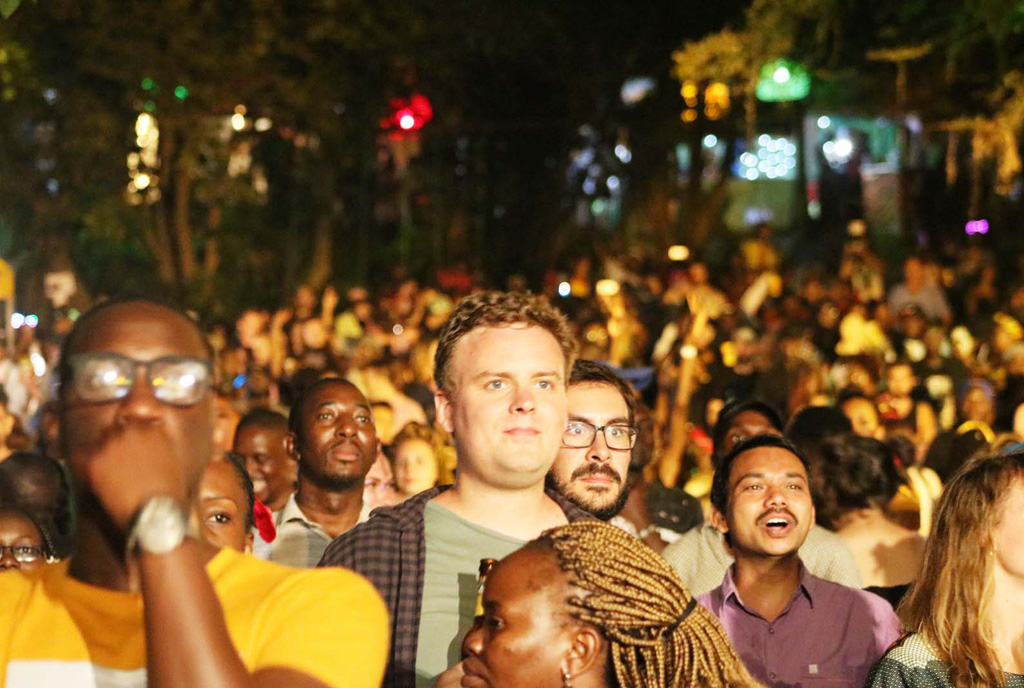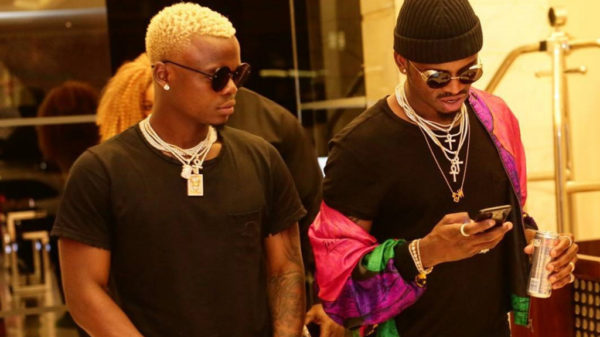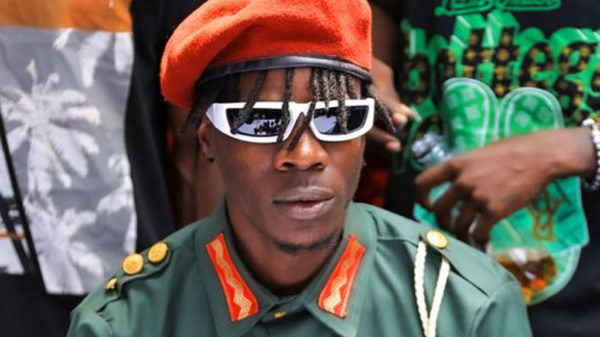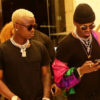
Ssebunjo with a personalised electric Kora. The original Koras, the musician says were too bulky. PHOTOS: GODFREY LUGAJJU.
WORLD RISING: Joel Ssebunjo is one of the pioneers of World Music in Uganda. He joined the industry about 11 years ago and has performed in more than 40 countries worldwide. He talked to Lawrence Ogwal about the future of World Music and the challenges being faced.
What have you been up to since your last concert?
I am always in and out of the country. I have performed at festivals around the world and met different artistes – such as Habib Koite and Djeli Mady Kone from Mali – with a view of collaborating with them on my new album. I have been to the Sancara Pan African Studio in Senegal.
What have you been up to since your last concert?
I am always in and out of the country. I have performed at festivals around the world and met different artistes – such as Habib Koite and Djeli Mady Kone from Mali – with a view of collaborating with them on my new album. I have been to the Sancara Pan African Studio in Senegal.
You travel a lot, when are you always in Uganda?
I have been in the country for the last three weeks. Next week, I will be travelling to Portugal for a performance. I should say I have several homes and Uganda is one of them, the others are in West Africa. I love West Africa because that is where my inspiration comes from; I like their artistes because they have great ideas in music.
Should we therefore say World Music started in West Africa?
It did not necessarily start in West Africa but West Africa was and is still a key player in the World Music movement. When it started, the pioneers of the style worked a lot with West Africans. American singers Peter Gabriel and Paul Simons preferred to work with South Africans and West Africans. Simons worked with Ladysmith Black Mambazo, a group known for singing about Apartheid and emancipation of black people. It was then that artistes like Youssou N’Dour and Baaba Maal from Senegal who are some of the pioneers from Africa inspired generations of artistes.
To a lay person, how would you define World Music?
World Music is simply a hybrid between different cultures, folk and urban, different region. You can call it an intermarriage or Afro-fusion. In World Music, an artiste goes somewhere, picks the style of music and adds it to their local style, the outcome is what can be referred to as world music.In 2015, you released an album titled ‘I Speak Luganda.’
What reception did it receive on the market?
‘I speak Luganda’ did very well on the global scene. It was a good album; it had excellent packaging, excellent sound and mastering. It was distributed in all continents; we sold many copies both online and at concerts around the world. I have no regrets of the album and I think the follow up of the album will even be much better.
What should we expect on your next album?
I am working on a conscious album, something educative, Pan African, something with a message and I should say, it will be 60 per cent full of a message.
World Music in Uganda is not popular, are Ugandans just ignorant about it?
Some Ugandans understand and others do not. It is not obvious music; it is not music that everybody does in Uganda. When you listen to radio, these songs are not played. It is only a few outgoing Ugandans who understand the music. It is only a few outstanding Ugandans who understand World Music.
By outgoing Ugandans what do you mean?
I mean Ugandans who travel a lot, those do lots of research about new music and they are not a big audience. It is probably about just 3 per cent of our population.
But why World Music?
When I was still in Senior One at Makerere College in 1998, I got to hear about Wes Madiko from Cameroon, Angélique Kidjo from Benin and Baaba Maal from Senegal. They had big hits which were played on MCM Africa. We were curious about their style; it was me, Micheal Ouma and Herbert Kinobe. We started experimenting with a band called Percussion Discussion and the music started growing slowly. At that time Samite Mulondo and Geoffrey Oryema were doing World Music in New York and London but no one knew them. We started doing the music to make it popular and it was after school that I did my first concert.
How was your first concert?
It was in 2006. It was the first World Music Concert in Uganda. I did not have any recordings but I just wanted to bring World Music to the attention of the public with some tunes that I had rehearsed. The concert was at Alliance Française but seems like most people didn’t understand my kind of music because the turn up was terribly very low. When we started, people did not know but now there is an awakening, they have started learning.
What did you learn from the concert flop?
A concert is a risk and a liability at the same time. You always expect worse or the best but most importantly you have to look at the bigger picture. A lot of artistes make concerts to make big money but concerts in Uganda do not make money. Everything is expensive from venues and service providers, sponsors do not give money, they give beer or services instead.
How was it starting out when people were already listening to Chameleone, Bebe Cool and Bobi Wine?
The Chameleones were already on the scene and they were advancing. Their music was playing on radio though they were not as big as they are now. We were not competing with them in anyway. At that time, there was a whole bunch of World Music artistes such as Michael Ouma, Sarah Ndagire, then Susan Kerunen came on board. Qwela Band also came but they were not purely a World Music band, they used to do covers, they came years after World Music had gained a little bit of momentum.
Does it hurt you that your crowd is not in Uganda?
I have a crowd here; if I did not then I would not be in Uganda. It is not about the crowd, it is about the audience that understands your mission. It is a matter of time and a crowd will come. World Music is not hit based, it is legacy based and that’s why I do not have to record a song to please anyone I am still touring the world with my old album. It is not about looking for hits but content, how you are using your content to promote culture.
In Uganda it is about weddings and corporate parties, how is it abroad?
Abroad things are organised, they put for you best sound and lighting, good money and audience. From abroad, I have learnt to be professional and I respect it, while there, people take you as a professional artiste. While there I play at festivals and Jazz Clubs with thousands of people in the audience.
How will you improve on the audience of World Music in Uganda?
It is a gradual process, time will come. Sometime back I wanted to do projects with Ugandan main stream artistes. I worked on a song with Jamal but I realised I was losing track, I was compromising my style. Their sound is already known by people and I do not want to be part of them because it will make me change my style of music. Next year I am planning on working with Bebe Cool, Apass, Afrigo Band and a few other artistes like Ceasorous. I have ideas but not time.
Do you hang out with mainstream artistes or they do not think you even exist?
Luckily, lots of mainstream artistes respect me because they know the weight of what I do because I have made a mark on the business although my songs do not play on TV and Radio but I have a big grip on the music Industry. Young artistes coming on board want to sing like me because they have seen what World Music has done to me, I hang out with Bebe Cool, Chameleone and Bobi Wine.
Why doesn’t World music play on Radio and TV?
I think World Music artistes including me have been so passive. We have a mentality of ‘we don’t give a damn’, we have to wake up and take songs to radio, we have to start shooting music videos.Why are there few World Music artistes in Uganda?
If you are not patient you can not manage. You can sing for six years and you are still broke. I have made it because I have been patient for the years I have been in; I have built a network and established a name because I have performed in more than 40 countries.
What has been your breakthrough as a World Music artiste?
I do not want to say I have broken through already. I have many land mark moments in my career but I think there is yet to come. How about I get a call one day and I am being invited by the Queen of England for her 200th Birthday party. In Austria, there is a music club called Porgy and Bess, every Jazz and World artiste dreams of performing there and it is hard. They want only extremely good artistes and I performed there in 2010.
Who inspires you as a World Music artiste?
I do not have people who inspire me in Uganda but I see people who are promising in Uganda. There are people like Jiovanni Kiyingi, Afrie and Aka Mukiga. The ones that inspire me are Ismail-Lo, Youssou N’Dour, Didi Awadi and others from West Africa.
What are some of the challenges that come with World Music?
The cost of production is hard and sometimes the record label can fail to release your music CDs because they are of a poor quality. Our music is also not understood in Uganda. I once gave Kasuku, a presenter on Dembe Fm my music but he was honest with me and told me my kind of music is hard for his listeners.
Can any producer come up with World Music?
World Music is not like mainstream music where everyone can come up with a recording. I have my producer in Kasubi called Sam Bisaso at Blacksmith Record but after recording I take it to France for mastering and mixing. There is a good studio in France called VitrySuv Seine, it is owned by an artiste who is from Ivory Coast but stays in France. I started working with Danz Ku Mapeesa on fusing and working with mainstream artistes but he was beaten up and is bedridden.
Who is Joel Ssebunjo?
Joel Ssebunjo was born at Mulago Hospital 31 years ago to the Late Paul Mulwana and Mrs Grace Mulwana. My father was a pharmacist so they moved in different places like Mukono, Kiira Road Flats and Nakulabye among other places. I attended Nkumba Primary School; Makerere College School before I went to Makerere University for a Degree in Music and after went to Finland where he studied World Music. I come from a family of only two boys.




























































